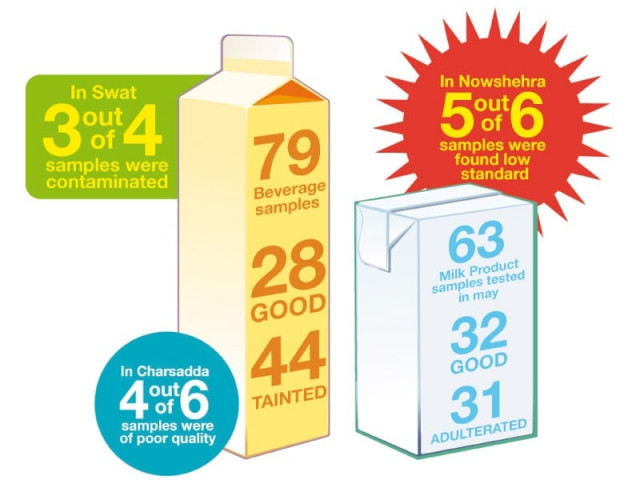Health hazard: Adulterated beverages continue to grow in K-P
Increasing demand for drinks in Ramazan places many at risk of serious ailments.

As the sales of adulterated beverages continue, their increasing demand during the month of Ramazan has put the lives of many across the province, at risk.
As the demand for cold drinks and milk increases in Ramazan, most people, particularly the middle class who cannot afford expensive beverages, become less concerned about the products’ quality.
In May, the Government Public Health Food Laboratory received 63 samples of milk and milk products from Khyber-Pakhtunkhwa. Out of those, 32 were found to be contaminated. Similarly, out of the 79 samples of various other beverages sent for quality assurance, only 28 were cleared.
In Nowshehra, six samples were collected, five of which were of low standard. In Charsadda four out of six were contaminated while three out of four were found impure in Swat.
“Milk and beverages containing contaminated water and chemicals, used to increase the quality of the product, mislead people who cannot differentiate whether a product is tainted or not,” Food Analyst Nighat Sultana told The Express Tribune.
Assistant Coordination Officer (ACO) Peshawar Zafar Ali Shah said that 80 per cent of the factories in the district have been sealed for producing substandard beverages and a number of persons have been fined and imprisoned. He added that this month, two factory workers were arrested and upon a tipoff, they raided another factory, recovering 600 contaminated bottles. The owner of the factory is under custody. “Those violating the Food Act could be charged between Rs15-200,000 in fines and can be imprisoned for 15 days,” he commented.
A doctor at Khyber Teaching Hospital, Dr Amir Khan said that the adulterated milk and beverages can cause various types of diseases particularly among the children.
“People prefer to buy cheap milk and beverages but those products become a curse for them... they can cause food poisoning, diarrhoea, anaemia and skin and eye problems,” he explained.
Published in The Express Tribune, August 1st, 2012.













COMMENTS
Comments are moderated and generally will be posted if they are on-topic and not abusive.
For more information, please see our Comments FAQ